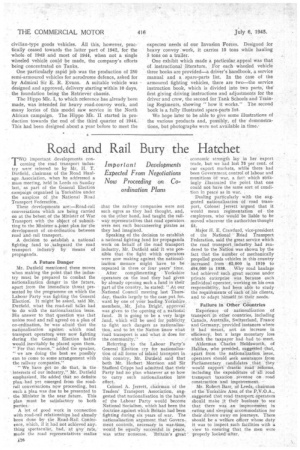Road and Rail Bury the Hatchet
Page 28

If you've noticed an error in this article please click here to report it so we can fix it.
Important Developments Expected From Negotiations Now Proceeding on Coordination Plans °TWO important .developments con1 earning the road transport industry were referred to by Mr, H. T. Dutfield, chairman of the Road Haulage, Association, when he addressed a mass meeting, held in Leeds on Sunday last, as part of the General Election campaign organized in Yorkshire under the auspices of the National Road Transport Federation.
These developments are:—Road-rail conversations .which are being carried on at the behest of the Minister of War Transport with the object of submitting-to the Minister .a.-joint plan -for' the development of co-ordination between road andrail transport.
A decision to establish a national fighting fund to , safeguard the .road transport industry by means of propaganda.
A Future Danger
Mr. Duffield mentioned these moves when making the point that the industry must be prepared to combat the nationalization danger in the future, apart from the immediate threat presented by the programme-on which the Labour. Party was fighting the General Election.% It might 'be asked, said Mr.. Dutfield, what the road-rail talks had to do with the nationalization issue. His answer to that question vyas that unless road and rail agreed On a plan of co-ordination, he was afraid that the nationalization against which road transport operators, were now fighting during the General Election battle would inevitably be placed upon them. " For that reason," added the speaker, " we are doing the best we possibly can to come to some arrangement with the 'railway companies."
"
We have gotto do that, in the • ,interests of our industry," Mr. Dutfield emphasized. He added that no definite van.,hacl yet emerged from the roadrail conversations now proceeding,. but such a plan was due to be presented to the Minister in the near future. This plan must be satisfaCtory to both parties.
A lot of good work in connection with road-rail relationships had already been done by the Road-Rail Conference, which, if it had not achieved anything spectacular, had, at any...rate, wade the road representatives realize that the railway companies were not such ogres as they had thought, and, on the other hand, had taught the railway representatives that road operators • were not such buccaneering pirates as they had imagined.
Speaking of the decision to establish a national fighting fund for propaganda work on behalf of the road transport industry, Mr. Duffield said it was possible that the fight which operators
were now making against the nationalization menace might have to be repeated in three or four years' time.
After complimenting Yorkshire operators on the lead they had given •
by already opening such a fund in their part of the country, he stated: " At our National Council meeting last Thurs day, thanks largely to the case put forward by one of your leaciing.Yorkshire
members, Mt. John 13right, approval.
was given to the opening of a national fund. It is going to be a very large
fund, which will be used for publicity to fight such dangers as nationalization, and to let the Nation know what road transport is and what it does for the community." '• — .
Referring to the Labour Party's General Election cry for nationaliza
tion of all forms of inland transport in this country, Mr. Dutfield said that both Mr. Herbert• Morrison and Sir Stafford Cripps had admitted that their Party had no plan whatever a,s to how to carry such nationalization into effect.
Colonel A. Jerrett, chairman of the Traders' Transport Association, sug gested that nationalization in the hands
of the Labour Party would become National Socialism, which had been the
doCtrine against which Britain had been • fighting during six years of war. The nationalization argument that Govern ment controls, necessafy in war-time, would be equally successful in pea6e, was utter nonsense. Britain's great
economic strength /ay in her export trade, but we had lost 15 per cent. of our export markets, while there had been Government control of labour and munitions Of war, a fact which strikingly illustrated the point that one could not have the same sort of condition in peace as in war, .
Dealing particularly with the suggested nationalization of road transport, Colonel Jerrett argued that it would mean regimentation of the employees, who would 'be liable to be moved wherever the authorities thought fit.
Major H. E. Crawfurd, vice-president of the National `." Rdad Transport Federation, said the great service which the road transport. industry had rendered to the Nation was shown by the fact that the number of mechanically propelled goods vehicles in this country
• increased from 62,000 . in 1919 to
494,000 in 1938. Why road haulage had achieved such great success under private enterprise was because each individual operator, working on his own responsibility, had been able to study • the requii-ementh of' each.of his clients, and to adapt himself to their .needs. •
Failure in Other "Countries
Experiencc of nationalization of transport' in other countries, including Canada, Australia, Switzerland, France and Germany, provided instances where it had meant, not an increase in efficiency, but a -large monetary loss which, the taxpayer had had to . meet.
Aldernian Charles Holcisworth,. of Halifax, who presided, saggested -that,
• apart' from the .nationalization issue,
operators should seek assurances from . .
'Parliamentary candidates that they would support' drastic road reforms, including the expenditure of all road transport taxation revenue on road construCtinn • 'and imprOv.etnerit. • • Mr. Robert Barr of Leeds; chairman of the' Yorkshire Area of the P,V.O.A.,
suggested that road transport operators
should make it their business .to see that there was an • improvement in eating and sleeping accommodation for their drivers away on journeys. There should be awelfare officer whose duty it was to inspect such facilities with a view to, ensuring that the men were properly looked after.




















































